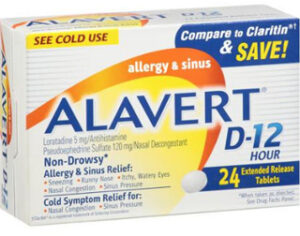Alavert is a brand name for the medication loratadine, which is an antihistamine used to relieve the symptoms associated with allergies. It is classified as a second-generation antihistamine and is available without a prescription in many countries. Alavert works by blocking the action of histamine, a substance in the body that causes allergic symptoms such as sneezing, itching, and runny nose. It is commonly used to treat hay fever (allergic rhinitis) and hives (urticaria).
When Not to Take Alavert
Alavert should not be taken if you have had an allergic reaction to loratadine or any of the other ingredients in the medication. It is also contraindicated if you have severe liver disease or if you are taking certain medications, such as ketoconazole or erythromycin. Additionally, Alavert should not be used in children under the age of 2 years without the advice of a healthcare professional.
Side Effects and Solutions
Common side effects of Alavert include headache, drowsiness, dry mouth, and stomach upset. These side effects are usually mild and transient. If any of these side effects persist or worsen, contact your healthcare provider. In rare cases, loratadine can cause serious allergic reactions, such as difficulty breathing, swelling of the face, lips, tongue, or throat, or severe rash. Seek immediate medical attention if you experience any of these symptoms while taking Alavert.
How to Take It
Alavert should be taken as directed by your healthcare provider or as instructed on the label. It is typically taken once daily with or without food. If you miss a dose, take it as soon as you remember. However, if it is close to your next scheduled dose, skip the missed dose and resume your regular dosing schedule. Do not take a double dose to make up for a missed one. In case of an overdose, seek emergency medical attention. Symptoms of an overdose may include drowsiness, fast or irregular heartbeat, and severe dizziness.
Alavert Compatibility
Alavert may interact with other medications, including some antidepressants, antifungal medications, and certain antibiotics. It is important to inform your healthcare provider about all the medications you are taking, including over-the-counter drugs and herbal supplements, before starting Alavert. This will help prevent any potential drug interactions and ensure the safe and effective use of the medication.
Your Questions Answered
-
1. Can I take Alavert while pregnant or breastfeeding?
It is important to consult your healthcare provider before taking Alavert during pregnancy or while breastfeeding. While there have been no significant studies indicating harm to the fetus or infant, it is best to err on the side of caution and seek medical advice. -
2. Can I drive or operate machinery while taking Alavert?
Alavert may cause drowsiness in some individuals. If you experience drowsiness or any other side effects that may impair your ability to drive or operate machinery, avoid such activities until you know how the medication affects you. -
3. Can Alavert be taken with alcohol?
It is generally recommended to avoid consuming alcoholic beverages while taking Alavert. Alcohol can increase the risk of drowsiness and other side effects associated with the medication. -
4. How long does it take for Alavert to start working?
Alavert typically starts working within 1 to 3 hours after administration. However, individual response may vary. If you do not experience relief from your symptoms after taking Alavert for a few days, consult your healthcare provider. -
5. Can I take Alavert with food?
Alavert can be taken with or without food, according to your preference. Taking it with food may help prevent stomach upset.


Reviews
There are no reviews yet.